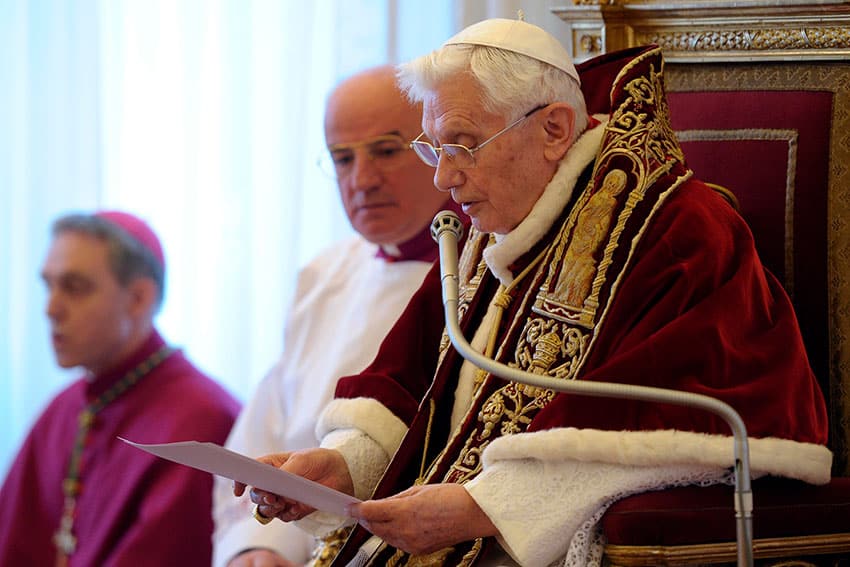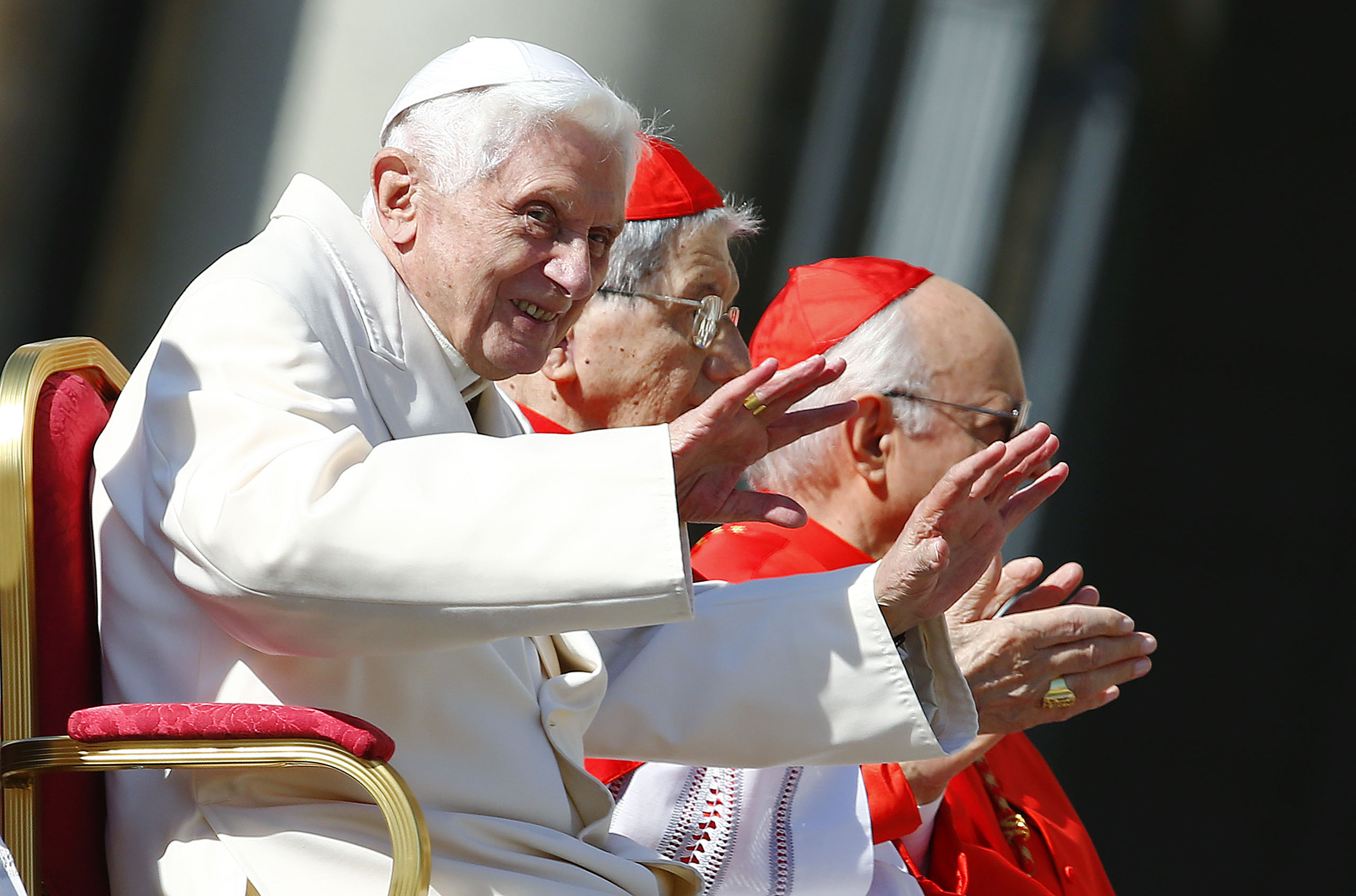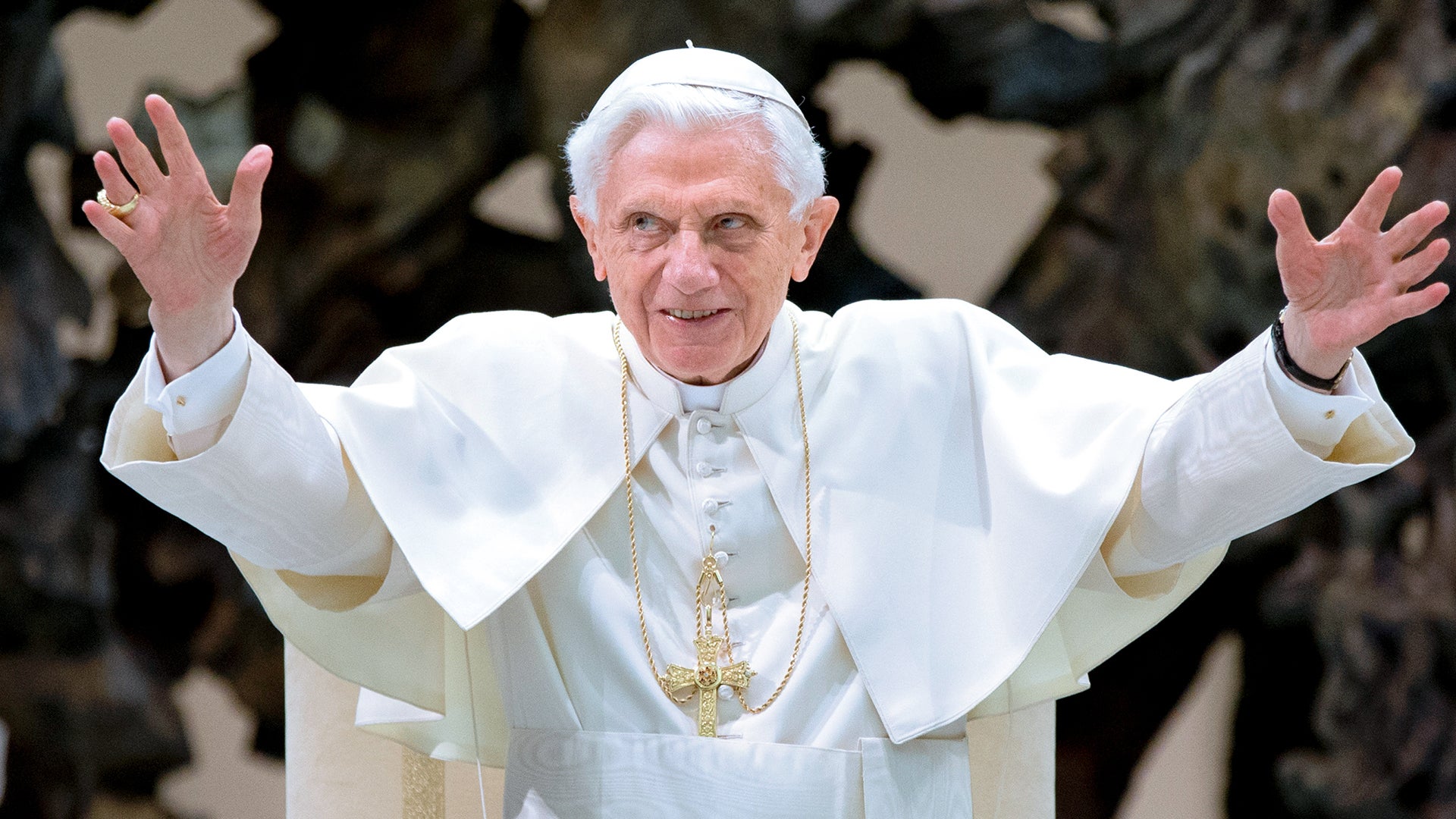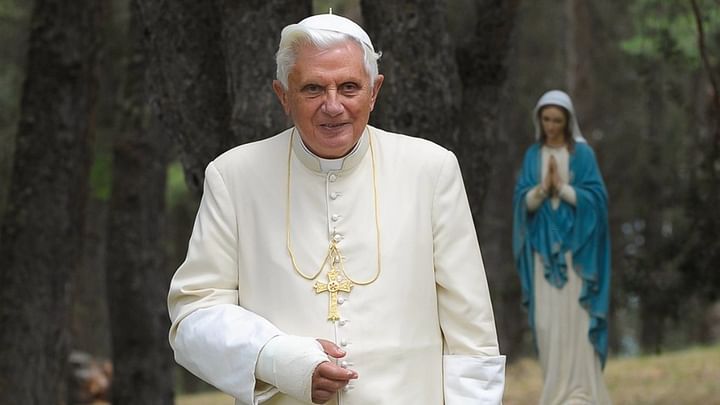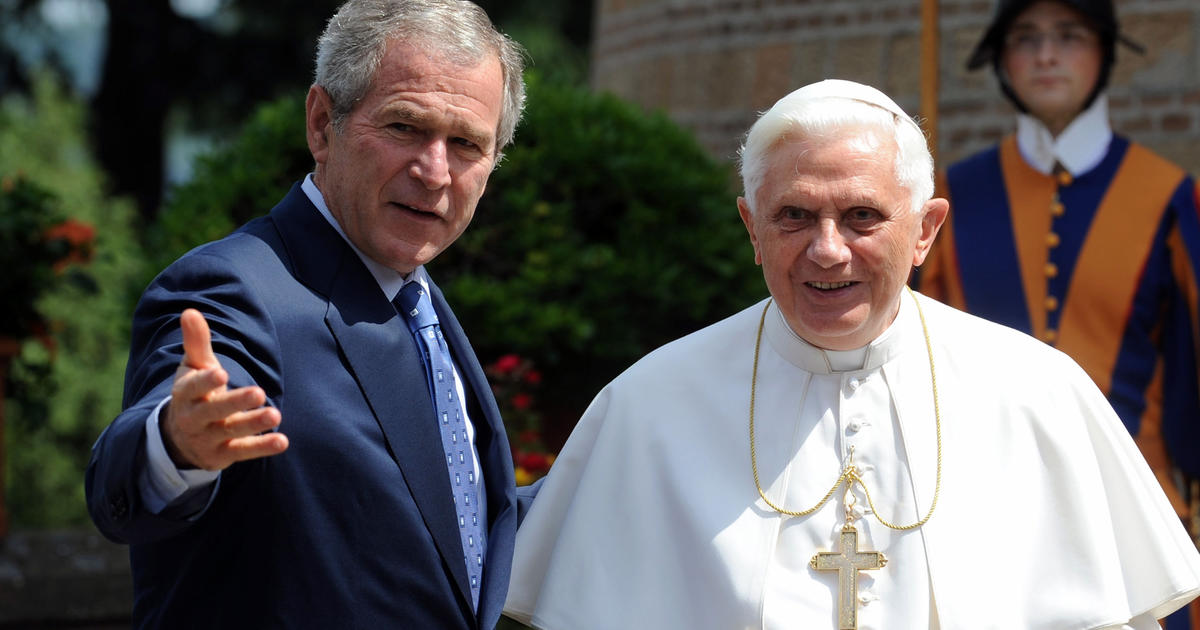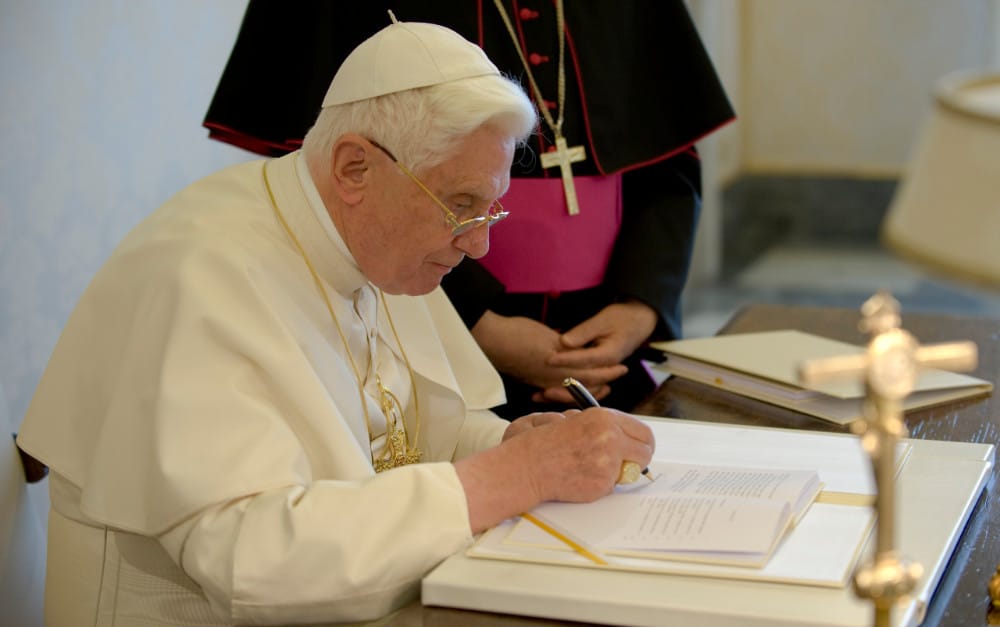World
Former Pope Benedict XVI Dead at Age 95

Former Pope Benedict XVI, the first pontiff to resign in 600 years, died on Saturday at the age of 95 in the Vatican, according to a Holy See spokesman. “With sadness, I inform you that Pope Emeritus Benedict XVI died today at 9.34 a.m. in the Mater Ecclesiae Monastery in the Vatican,” a spokesman said in a written statement.
According to the Vatican, Pope Francis will preside over his predecessor’s funeral on January 5.
Benedict, the first German pope in 1,000 years, stepped down in 2013 due to failing health, leaving behind a Catholic Church beleaguered by sexual abuse scandals, mired in mismanagement, and divided between conservatives and progressives.
He had good relations with his successor, but his continued presence inside the Vatican after he stepped down polarized the Church ideologically even more.
Concerned about Pope Francis‘s progressive moves, conservatives looked to Benedict as the defender of tradition. Several times, he had to tell nostalgic visitors, “There is only one Pope, and his name is Francis.”
Pope Benedict, a pianist and formidable theologian, was a weak leader who struggled to impose himself on the opaque Vatican bureaucracy and stumbled from crisis to crisis during his eight-year reign.
He repeatedly apologized for the Church’s failure to root out clergy sexual abuse of children, and despite being the first pope to take serious action against abuse, his efforts failed to halt a rapid decline in church attendance in the West, particularly in Europe.
Pope Benedict XVI Resigns
In 2022, an independent report in his native Germany claimed Benedict failed to act in four abuse cases while serving as Archbishop of Munich between 1977 and 1982. After being shaken by the report, he apologized in an emotional personal letter and asked for forgiveness.
In a detailed rebuttal, his lawyers argued that he was not directly to blame.
Victims’ groups claimed that the evasive response squandered an opportunity arising from a scandal that shook the Church worldwide.
On February 11, 2013, Benedict shocked the world by announcing in Latin that he was resigning, telling cardinals that he was too old and frail to lead an institution with over 1.3 billion members.
It was always going to be difficult following the death of his charismatic predecessor, Pope John Paul II, in 2005, and Benedict admitted to difficulties in an emotional farewell address.
“There were happy and light moments, but there were also difficult moments.” “There were moments… when the seas were rough and the wind blew against us, and it seemed as if the Lord was sleeping,” Benedict said to a crowd of more than 150,000 people at his last general audience.
On February 28, 2013, Benedict took up residence at the papal summer retreat at Castelgandolfo, south of Rome, while cardinals from around the world gathered in the Vatican to elect his successor.
Pope Francis’ election
Prior to formally stepping down, Benedict and his aides chose the title “pope emeritus” and decided he would continue to wear a white cassock, albeit a slightly modified version. Some in the Church objected, claiming that he had tied his successor’s hands.
They said he should have dressed like a cardinal or a priest in red or black.
Following Pope Francis’ election on March 13, Benedict moved into a converted convent on Vatican grounds to spend his final years praying, reading, playing the piano, and receiving visitors.
He appeared in public only on rare occasions, usually for major Church ceremonies, though he paid an emotional visit to his ailing elder brother Georg, a priest, in Bavaria in June 2020. Georg died soon after, at the age of 96.
Benedict did not keep his promise to remain “hidden from the world,” and his writings in retirement occasionally caused controversy and confusion.
In a 2019 essay for a German Church magazine, he blamed the crisis over priest abuse of children on the 1960s sexual revolution, what he called homosexual cliques in seminaries, and a general collapse in morality.
Critics accused him of attempting to shift blame away from the institutional Church’s hierarchy. Conservatives, however, rejoiced, and rallied to his defense.
Benedict and the cardinal
The ambiguity surrounding Benedict’s role reached a head in January 2020, when it was revealed that he was involved in a book written by a conservative cardinal that some saw as an attempt to influence a document Pope Francis was preparing.
As a result, Francis fired Archbishop Georg Ganswein, Benedict’s secretary, from a top Vatican position. Many people believed Ganswein misled Benedict, the cardinal, or both as a middleman between Benedict and the cardinal.
Some Vatican officials have called for clear rules regarding the status of any future pontiff who resigns as a result of the incident.
Francis has stated that if he were to resign, he would prefer the title Emeritus Bishop of Rome, as suggested by some. He has also stated that he will not live in the Vatican but rather in a Rome home for retired priests.
Benedict, an uncompromising conservative on social and theological issues, literally cloaked himself in tradition during his papacy, frequently donning fur-trimmed capes and red shoes in public appearances — a stark contrast to his successor’s more humble, down-to-earth style.
He enraged Muslims by implying that Islam is inherently violent, and he enraged Jews by rehabilitating a Holocaust denier. The gaffes and blunders reached a climax in 2012, when leaked documents revealed corruption, intrigue, and feuding within the Vatican.
As a result of the “Vatileaks” case, his butler, Paolo Gabriele, was arrested and convicted of passing secret documents to a journalist. Benedict later forgave him. Gabriele was hired at a Vatican-owned hospital and died there in 2020.
Gay Clergy Lobby
The media speculated that the saga, which exposed allegations of a gay clergy lobby operating against the pope, might have put pressure on him to resign. Benedict insisted on stepping down because he could no longer bear the full weight of the papacy, including the exhausting international travel required by the job.
In a book-length interview published in 2016, he acknowledged his flaws but stated that his papacy was not a failure.
“Perhaps one of my weaknesses is a lack of resolve in governing and making decisions. In reality, I am more of a professor, someone who reflects and meditates on spiritual issues,” Benedict stated in the book “Last Testament,” written by German journalist Peter Seewald.
“Practical government is not my strong point and that is certainly a weakness. But I don’t consider myself a failure.” On April 16, 1927, in the southern German village of Marktl, close to Austria, Joseph Aloisius Ratzinger was born.
During World War II, he was forcibly enrolled in the Hitler Youth and briefly held as a prisoner of war by the Allies, but he was never a member of the Nazi party.
“Neither Ratzinger nor any member of his family were National Socialists,” wrote John Allen, a leading Church expert, in a biography of Benedict.
Ratzinger was ordained as a priest in 1951 and rose to prominence as a liberal theological adviser at the Second Vatican Council, which convened in 1962 and resulted in profound Church reform.
God’s Rottweiler
The Marxism and atheism of the 1968 student protests across Europe, on the other hand, prompted him to become more conservative in order to defend the faith against growing secularism.
After stints as a theology professor and then Archbishop of Munich, Ratzinger was appointed in 1981 to head the Congregation for the Doctrine of the Faith (CDF), the successor office to the Inquisition, where he earned the epithet “God’s Rottweiler”.
After a period of experimentation, he and Pope John Paul agreed that traditional doctrine needed to be restored in the Church.
Ratzinger first addressed the popular “liberation theology” in Latin America, ordering the one-year silence of Brazilian friar Leonardo Boff in 1985, whose writings were criticized for using Marxist ideas.
Ratzinger applied pressure on theologians, primarily in Asia, who saw non-Christian religions as part of God’s plan for humanity in the 1990s.
Ratzinger’s office condemned “radical feminism” in a 2004 document as an ideology that undermined the family and obscured the natural differences between men and women.
Benedict sought to show the world the gentler side of his nature as Pope from 2005, but he never achieved the “rock star” status of John Paul or appeared particularly at ease in the job.
Child abuse scandals dogged him for the majority of his pontificate. He called for an official investigation into abuse in Ireland, which resulted in the resignation of several bishops.
During his pontificate, however, the Vatican’s relations with once-devoutly Catholic Ireland deteriorated. In 2011, Dublin closed its embassy to the Holy See.
Profound consternation
Victims demanded that the International Criminal Court investigate him. The Vatican ruled that he could not be held accountable for the crimes of others, and the court declined to hear the case.
In September 2013, he denied covering up the scandals. “As for your mentioning moral abuse of minors by priests, as you know, I can only acknowledge it with profound consternation.
“However, I never attempted to conceal these facts,” he wrote in a letter to Italian author Piergiorgio Odifreddi.
Benedict visited his homeland three times as Pope, confronting its dark past at the Nazi death camp at Auschwitz in Poland. As a “son of Germany,” he prayed and asked why God was silent when 1.5 million people, mostly Jews, died there during World War II.
One of his trips to Germany triggered the first major crisis of his pontificate. In a 2006 university lecture, he quoted a 14th century Byzantine emperor as saying that Islam had only brought evil to the world, which was spread by the sword.
Following protests that included attacks on churches in the Middle East and the killing of a nun in Somalia, the pope apologized for any confusion his speech had caused.
Later that year, in a move widely perceived as conciliatory, he made a historic trip to predominantly Muslim Turkey, praying in Istanbul’s Blue Mosque with the city’s grand mufti.
Offending the Jews
In 2008, the pope visited the United States, where he apologized for the sexual abuse scandal, promised that pedophile priests would be expelled, and consoled abuse victims. But Benedict made a series of errors in 2009.
After lifting the excommunication of four traditionalist bishops, one of whom was a notorious Holocaust denier, the Jewish world and many Catholics were outraged. Benedict later stated that the Vatican should have done more research on him.
Jews were offended again in December 2009, when he relaunched the process of resurrecting his wartime predecessor Pius XII, who was accused by some Jews of turning a blind eye to the Holocaust, after a two-year pause for reflection.
In March 2009, the Pope shocked the world by telling reporters on a plane flying to Africa that the use of condoms in the fight against AIDS only made matters worse.
Benedict preferred to appoint men he trusted at the Vatican, and some of his early appointments were questioned.
He appointed Cardinal Tarcisio Bertone, who had worked with him in the Vatican’s doctrinal office for years, as secretary of state, despite the fact that Bertone had no diplomatic experience. Bertone was later embroiled in a financial scandal involving the renovation of his Vatican apartment.
Pope Benedict wrote three encyclicals
Other religions criticized Benedict in 2007 when he approved a document that reiterated the Vatican’s position that non-Catholic Christian denominations were not full churches of Jesus Christ.
Critics saw his papacy as a concerted effort to reverse the reforms of the Second Vatican Council of 1962-1965, which modernized the Church in sometimes turbulent ways.
Some Council decisions were rewritten by Benedict to conform to traditional practices such as the Latin Mass and highly centralized Vatican rule. One of the themes he frequently returned to was the threat of relativism, which rejected the idea that moral values were not absolute but rather relative to those who held them and the times in which they lived.
Pope Benedict wrote three encyclicals, the most important type of papal document, including Spe Salvi (Saved by Hope), an attack on atheism, in 2007. The 2009 Caritas in Veritate (Charity in Truth) declaration called for a rethinking of how the global economy is run.
Despite the difficulties that came with having two men dressed in white in the Vatican, Francis developed a warm relationship with the man who was once dubbed “the Panzer Cardinal” and described it as being like having a grandfather in the house.
“He speaks little… but with the same profundity,” Francis once said.
Celebrity
Bernice Johnson Reagon, Whose Powerful Voice Helped Propel The Civil Rights Movement, Has Died

Nashville, Tennessee – Bernice Johnson Reagon, a musician and scholar who utilised her rich, powerful contralto voice to support the American Civil Rights Movement and global human rights campaigns, died on July 16, according to her daughter’s social media post. She was 81.
Reagon was best known as the founder of Sweet Honey in the Rock, an internationally recognized African American female cappella group that she managed from 1973 until her retirement in 2004. The Grammy-nominated group’s purpose has been to educate, empower, and entertain. They sing songs from various genres, including spirituals, children’s music, blues, and jazz. Some of their original compositions pay tribute to American civil rights leaders and foreign liberation movements, such as the struggle against apartheid in South Africa.
Bernice Johnson Reagon, Whose Powerful Voice Helped Propel The Civil Rights Movement, Has Died
“She was incredible,” said Tammy Kernodle, a prominent professor of music at Miami University with a focus on African American music. She referred to Reagon as someone “whose divine energy, intellect, and talent all intersect in such a way to initiate change in the atmosphere.”
According to an obituary posted on social media by her daughter, musician Toshi Reagon, Reagon’s musical activism began in the early 1960s when she worked as a field secretary for the Student Nonviolent Coordinating Committee and became an initial member of the Freedom Singers. In 2010, the trio reassembled and was joined by Toshi Reagon to play for then-President Barack Obama in a White House performance series televised nationally on public television.
Reagon was born in 1942 in Dougherty County, Georgia, outside of Albany. In the early 1960s, he attended music workshops at Tennessee’s Highlander Folk School, an activist training ground. At an anniversary celebration in 2007, Reagon explained how the institution helped her recognize her musical history as unique.
“From the time I was born, we were always singing,” Reagon told me. “When you’re in a culture and, quote, ‘doing what comes naturally to you,’ you don’t notice it. I believe my work as a cultural scholar, singer, and composer would have been very different if someone had not drawn my attention to the people who need songs to stay alive, to keep themselves together, or to boost the energy in a movement.”
Reagon was arrested and dismissed from Albany State College after participating in a civil rights march. She eventually graduated from Spellman College. While a graduate student of history at Howard University and the vocal director of the D.C. Black Repertory Company, she founded Sweet Honey in the Rock.
In 1965, Reagon recorded her debut solo album, “Folk Songs: The South,” for Folkways Records. She joined Atlanta’s Harambee Singers as a founding member in 1966.
According to the Smithsonian, Reagon began working with the institution in 1969 when she was asked to organize and manage a 1970 festival program called Black Music Through the Languages of the New World. She went on to curate the African Diaspora Program and establish and lead the Program in Black American Culture at the National Museum of American History, where she ultimately became curator emeritus. She produced and played on many Smithsonian Folkways recordings.
Reagon was a distinguished professor of history at American University in Washington for a decade, commencing in 1993 and ending as a professor emerita.
According to Kernodle, we think that music has always been a component of civil rights activity, but it was people like Reagon who made music “part of the strategy of nonviolent resistance.” They brought those songs and practices from within the church to the streets and jail cells. And they popularised such songs.”
Bernice Johnson Reagon, Whose Powerful Voice Helped Propel The Civil Rights Movement, Has Died
“What she also did that was very important was that she historicised how that music functioned in the civil rights movement,” according to Kernodle. “Her dissertation was one of the first real studies of civil rights music.”
Reagon won two George F. Peabody Awards, including one for her role as lead scholar, conceptual producer, and host of the Smithsonian Institution and National Public Radio series “Wade in the Water: African American Sacred Music Traditions.”
She has received the Charles E. Frankel Prize and Presidential Medal for distinguished contributions to public awareness of the humanities, a MacArthur Fellows Program award, and the Martin Luther King Jr. Centre for Nonviolent Social Change’s Trumpet of Conscience Award.
SOURCE | AP
Sports
Athletes Enjoying Their First Days At The Giant Olympic Village Ahead Of The Paris Games

Turner Sports hopes to continue its long-standing relationship with the NBA.
Warner Bros. Discovery informed the league on Monday that it will match Amazon Prime Video’s $1.8 billion annual bid. Turner has had an NBA package since 1984, and games have been broadcast on TNT since the network started in 1988.
“We studied the offers and accepted one of them. This will allow fans to continue to experience our unequaled coverage, including the greatest live game productions in the business, as well as our legendary studio shows and talent, as we build on our proven 40-year commitment for many more years,” WBD stated. “We submitted our matching paperwork to the league today.” We are looking forward to the NBA completing our new contract.”
paris | AP News
Athletes Enjoying Their First Days At The Giant Olympic Village Ahead Of The Paris Games
The NBA Board of Governors approved the league’s 11-year media rights deals with Disney, NBC, and Amazon Prime Video at its meeting in Las Vegas on Tuesday. WBD received all three contracts on Wednesday, beginning the five-day clock for deciding whether to match.
The new deals, for $76 billion, will begin with the 2025-26 season and entail a game being shown or streamed nationally every night during the second half of the season.
The Prime Video package would have offered games on Thursday night after it finished carrying NFL games. The other nights were Friday and Saturday.
TNT would most likely air games on Thursday, with the other nights being streamed on Max.
Warner Bros. Discovery CEO David Zaslav warned at an RBC Investor Conference in November 2022 that Turner and WBD “don’t have to have the NBA.”
Warner Bros. Discovery and the league were unable to negotiate an agreement during their exclusive bargaining period, which ended in April. Zaslav and TNT Sports Chairman/CEO Luis Silberwasser have recently announced that they intend to match one of the agreements.
“During our four-decade collaboration with the NBA, we have consistently provided exceptional coverage for basketball fans. WBD stated that they behaved in good faith to offer strong proposals that were fair to both parties throughout exclusive and non-exclusive negotiations to maintain their long-standing collaboration. “Regrettably, the league notified us of its intention to accept other offers for the games in our current rights package, leaving us to proceed under the matching rights provision, which is an integral part of our current agreement and the rights we have paid for under it.”
NBC and WBD would alternate broadcasting one of the conference finals series. ESPN and ABC will continue to broadcast the league’s top package and will host conference finals and the NBA Finals each year.
According to people familiar with the negotiations, Amazon’s offer contained a mechanism for paying many years in advance into an escrow account, which many thought would be difficult to match. However, WBD has informed the league that it has the financial resources to do so.
“The Ringer’s” Bill Simmons originally mentioned the Amazon provision on “The Town” podcast.
People talked to the A.P. anonymously because they were not at liberty to discuss such serious topics.
WBD pays $1.4 billion per season under the existing nine-year contract, which expires after next season.
WBD is making a large financial investment, but it is necessary. Without the NBA, it would have struggled to charge its present subscriber fees to cable and satellite companies.
Retaining the NBA would also ensure that the popular “Inside the NBA” show will continue. Charles Barkley was dismissive of WBD’s negotiation position and did not believe it would match. Barkley revealed at the end of this season that he planned to retire following the next season.
The village is located in the Saint-Denis district, best known for hosting the Stade de France, home to France’s national soccer and rugby teams. It is located in a once run-down district that has been converted into a dynamic international hub for the Paris Games from July 26 to August 11, as well as the Paralympics from August 28 to September 8.
“It’s great to see so many different countries here,” U.S. rugby sevens center Lucas Lacamp said Monday.
The village has a huge dining hall with several food stations catering to diverse tastes worldwide, a large gym, training grounds for various sports, a polyclinic, prayer rooms, and an anti-doping center.
“I was definitely looking forward to the food court, I won’t lie about that,” said New Zealand rugby sevens player Risaleanna Pouri-Lane, who won the women’s gold medal in Tokyo. “It has been pretty cool. We’ve got a couple of days to soak up the entire village and Olympic environment in Paris.”
Andrew Knewstubb, a silver winner in men’s rugby in Tokyo, emphasized the stark contrast between pandemic-hit Tokyo three years ago and Paris.
“The most noticeable thing is that people are not wearing masks in Paris,” Knewstubb said, adding that he loves how athletes can now greet one other or walk up and swap pins “without the hesitation of Covid.”
Athletes live in five residential zones named after famous Parisian landmarks: Abbesses, Bastille, Dauphine, Étoile, and Fêtes. With environmental protection in mind, the eco-friendly community uses electric automobiles to transport athletes. Pouri-Lane enjoyed riding one of the several bicycles available to athletes.
Anna Meares, a former track cycling star, has four Olympic medals, two of which are gold. Meares is now the Australian team’s Chef de Mission, and he stated that decisions have been made about the team’s residency in the hamlet.
“There was a lot of learning to take out of Tokyo, that played in the decisions we have made in our set up in Paris,” she told me.
Paris | AP news Image
Athletes Enjoying Their First Days At The Giant Olympic Village Ahead Of The Paris Games
One of them was more significant than it may appear.
“We have kept our barista,” she stated. “One big question I had when I took on this role in Paris was, ‘Why was the barista so popular?'” And that was because it established a social hub for the athletes.
Meanwhile, the American men’s rugby sevens squad is ready for a big game on Wednesday against host France, which has probably the best scrumhalf in the world in Antoine Dupont.
“The preparation has been good. “They’ve taken great care of us in Paris; the fields and facilities were excellent,” said U.S. captain Kevon Williams. “Things have been going smoothly for us. “We’re prepared for the moment.”
That moment will be met with the roar of an 80,000-person sell-out crowd at the Stade de France. Williams and his teammates should enjoy a memorable experience at France’s iconic national stadium, but beach volleyball players have possibly the best location of all.
They play their matches against the backdrop of the Eiffel Tower, which, as famous sites go, is difficult to beat.
“I am not being biased, but I believe it is the best venue of them all,” Artacho del Solar stated. “It’s going to be amazing.”
They got a taste of what was coming when they watched a video of the Australian men’s training session.
“We know it’s going to be electric, exciting, as beach volleyball always is,” said Clancy, whose first assignment during her first practice session was to test the wind, sand depth, and grain quality.
SOURCE | AP
World
Too Soon For Comedy? After Attempted Assassination Of Trump, US Politics Feel Anything But Funny

Political jokes: is it too soon?
Many quarters responded with a loud yes at midweek, days after an assassination attempt on Republican former President Donald Trump shook the nation over decades of political violence in the United States.
Several late-night shows that rely on political humor instantly modified their plans, with Comedy Central’s “The Daily Show” canceling its Monday show and intending to broadcast from the Republican National Convention in Milwaukee this week. Its host, Jon Stewart, and his guests gave sad monologues.
By Tuesday, the comic rock duo Tenacious D, comprised of Jack Black and Kyle Gass, had canceled the remainder of their global tour “and all future creative plans” after Gass proclaimed onstage his birthday wish: “Don’t miss next time.” Gass apologized.
Too Soon For Comedy? After Attempted Assassination Of Trump, US Politics Feel Anything But Funny
Democratic President Joe Biden, no stranger to criticizing Trump, contacted his wounded competitor, paused his political advertisements and messaging, and urged the country to “cool” the rhetoric.
So, if comedy is tragedy plus time, when is joking acceptable again? And who gives a thumbs up, given that the shooter who targeted Trump also killed former fire chief Corey Comperatore while protecting his family?
The attempted assassination on Saturday, or any of the bloodshed that has afflicted the United States since its inception, is not funny. Trump was smacked in the ear while speaking to rallygoers in Pennsylvania. A Trump supporter and the gunman were dead, while two onlookers were injured. The attack sparked severe concerns about security shortcomings. It was the most recent example of political violence in America, where attacks on politicians date back to at least 1798 when two legislators from opposite parties brawled in the United States House.
Other examples abound in history texts, but the list from this century is particularly striking. Former Arizona Representative Gabby Giffords, D, was shot in the head in 2011. Republican Rep. Steve Scalise of Louisiana, the current House majority leader, was shot and badly injured in 2017. On January 6, 2021, a mob of Trump supporters invaded the US Capitol, preventing Congress from certifying Biden’s election. Paul Pelosi was bludgeoned at his home in 2022 by a guy looking for his wife, former House Speaker Nancy Pelosi.
In addition to that, unwavering fears about Biden’s fitness for office following his catastrophic debate performance, Trump’s conviction on 34 felony counts, and American politics in 2024 appear anything but hilarious.
However, political comedy is as old as politics and administration.
It softens the impact of democratic decisions and is a powerful tool for politicians aiming to alleviate or increase concerns about themselves or their opponents. And in recent years, Trump has been the focus of more jokes than anyone else. According to a 2020 study by George Mason University’s Center for Media and Public Affairs, late-night hosts made 97% of their jokes about Trump.
“It’s never too soon, unless it’s not funny,” Alonzo Bodden, a 31-year-old stand-up comedian, said in a phone interview Wednesday. He is not a Trump supporter but stated that comedians “will always make it funny no matter what happens.” That is what we do. “It is how we communicate.”
“In this case, Donald Trump is such a character and the fact that he wasn’t killed, the jokes started immediately,” said Bodden. “And I don’t believe he minds. He’s one of those persons who is always happy to be mentioned.”
Humor humanizes large figures.
Perhaps most effectively, political humor can make arrogant leaders appear more human or at least self-conscious.
Consider “covfefe,” Trump’s strange middle-of-the-night tweet in 2017 that went viral, prompting Jimmy Kimmel to despair that he’ll never write something funnier. “Make the Pie Higher,” a poem by late Washington Post cartoonist Richard Thompson, was composed solely of President George W. Bush’s botched words and was published for his inauguration in 2001.
“It is a very complicated economic point I was making there,” Bush said with a smirk at the Radio and Television Correspondents Dinner a few months later. “Believe me, what this country needs is taller pie.”
Before the debate, Biden attempted to use humor to bring the age issue to the forefront, but it became evident that the concern was more about his cognitive ability. “I know I’m 198 years old,” Biden declared, to wild laughter and clapping.
Too Soon For Comedy? After Attempted Assassination Of Trump, US Politics Feel Anything But Funny
Humor is such an effective campaign tactic that candidates flock to guest appearances on late-night shows, which have risen in political prominence. However, following the assassination, a pause settled over everything, as indicated by Stewart’s serious address on Monday.
“None of us knows what’s going to happen next other than there will be another tragedy in this country, self-inflicted by us to us, and then we’ll have this feeling again,” Stewart told the crowd.
“Though I could just as easily start the show moaning on the floor,” he laughed, “because how many times do we need to learn the lesson that violence has no role in our politics?”
As is customary for social media, it was acting more freely. “I think it’s ironic that Trump almost died from a gun today because he was too far right-leaning,” comedian Drew Lynch remarked on YouTube. “Alright. That’s all I have. I believe my neighbors might be listening.”
SOURCE | AP
-
World2 weeks ago
Former President Trump Survives Being Shot at Pennsylvania Rally
-
Tech4 weeks ago
Huawei Launches 5G-A Pioneers Program at MWC Shanghai 2024: Paving the Way for a Connected Future
-
Sports4 weeks ago
NBA Draft: Kyle Filipowski Withdraws Unexpectedly From The First Round
-
Tech4 weeks ago
ChatGPT Answers Undiscovered Questions and Outperforms Students.
-
News4 weeks ago
US Supreme Court Rejects Drug Deal that Protects the Sackler Family
-
Business4 weeks ago
Free Speech And Digital Rights Groups Argue TikTok Law Would Infringe On The First Amendment

